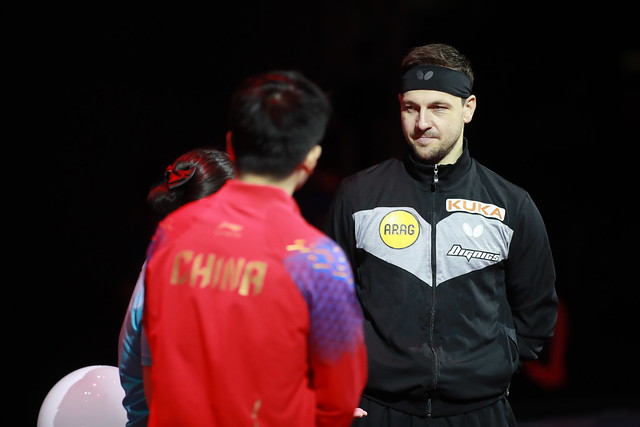by Ian Marshall, Editor
He commenced proceeding in the no.15 spot (344 points); the semi-final win against colleague, Dimitrij Ovtcharov (11-4, 9-11, 11-8, 8-11, 11-7, 8-11, 11-6), meant that mathematically he was assured of a qualification place. The no.10 spot (544 points) was to be the eventual outcome.
However, the fact that he had booked the place in the Grand Finals was total overshadowed by the performance against China’s Fan Zhendong; he held three match points in the deciding game, before eventually succumbing to defeat (11-2, 4-11, 11-13, 5-11, 11-3, 11-5, 14-12).
In their six encounters on the international scene, it was the closest he had every come against the player now listed at no.1 on the world rankings but should that no be the other way around?
Timo Boll is now 38 years, when the World Veteran Championships are held in 2022 in Oman, he’ll be eligible; Fan Zhendong is a mere 22 years of age and when they first met on the international scene in the quarter-finals of the men’s singles event four years ago at the Qoros 2015 World Championships, Fan Zhendong was only 18 years old and still in the junior ranks. On that occasion Fan Zhendong won in six games (12-10, 11-9, 8-11, 11-7, 13-15, 11-7).

The Hague, 1995
We knew of this bright young German player but it was the European Youth Championships staged in The Hague in late July and early August 1995 when we really took note of the name; he won gold in the cadet boys’ team event alongside Björn Baum, Jens Lilienthal and Nico Stehle. Later he secured the cadet boys’ doubles title in partnership with Jens Lilienthal before beating Frenchman Jean-Sebastien Boisard in the cadet boys’ singles final.
Now approaching 25 years later, Timo Boll continues to play at the very highest level; in any sport that is a long career and it continues.
He progressed in his formative years when very much forehand top spin was a key feature; in the late 1980s and early 1990s European men had enjoyed six years ascendancy on the global scene. Timo Boll followed the path of a lethal forehand but he stood out from the rest, the amount of top spin he imparted on the first three attacking stroke was massively significant.

Breakthrough
The result was that in 2002 he made a major breakthrough at senior level. In Rotterdam on Sunday 10th February, he won the Europe Top 12; he beat Vladimir Samsonov of Belarus in the final (12-14, 11-6, 9-11, 8-11, 11-7, 14-12, 11-7). Not only did he win, he won at the first attempt and became the first ever German to secure the title!
Later in the same year in Zagreb on Sunday 7th April he clinched the men’s singles title at the Liebherr European Championships, accounting for Kalinikos Kreanga of Greece in the final (11-9, 4-11, 11-8, 3-11, 11-7, 11-6), before sensationally on Sunday 3rd November in Jinan, he beat China’s Kong Linghui, the reigning Olympic champion playing on home soil (8-11, 12-10, 11-9, 11-9, 13-11) to secure the Men’s World Cup title. Just as in Rotterdam, he was on debut.

Adapt
The technique worked a treat but follow that style today and at top level it will not work; Timo Boll had to change. Now watch Timo Boll, while to forehand is still the prime weapon, the backhand appears more and more effective as the years advance and it imparts severe amounts of top spin on the ball.
In a different era, just as in 2002 when in Jinan he had beaten Kong Linghui and notably at the quarter-final stage, Wang Liqin, the incumbent world champion (11-9, 11-5, 11-4, 11-6); now approaching two decades later, Timo Boll still rates amongst the very best in the world.
Generations have come and gone but Timo Boll continues at the highest level; he continues because he adapted, the mark of a really great player; he continues because the appetite is still present and he continues because of the most important factor of all, he respects the sport of table tennis.







